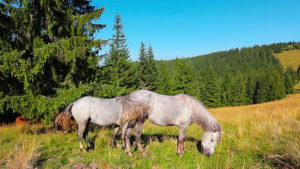A popular definition of insanity is “doing the same thing over and over again and expecting different results.” A 1983 speaker put it this way: “If you always do what you’ve always done, you always get what you’ve always gotten.” It may be the perfect definition of our approach to natural resources management.
We respond to crises. When disaster strikes (hurricanes, floods, gasoline shortages, oil spills, etc.), the stereotypical American reaction is: “there ought to be a law.” Congress appropriates billions, agencies create new offices, and bureaucrats make new rules. Committee meetings, public hearings, and voluminous studies follow, and before long every crisis has been studied to death. The next disaster produces the next round of studies, appropriations, and regulations. None of it ever prevents the next one.
There are no more timely examples than the raging fires that incinerate vast expanses of the American West, destroying homes and businesses, devastating communities, deforesting public land, polluting watersheds, and annihilating wildlife.
Those of us blessed with shelter this holiday season can’t help remembering the thousands left homeless by these appalling fires, such as those that burned across California this year. At least 44 people were killed and almost 15,000 homes burned, along with 728 apartment buildings, and more than 3,500 vehicles. The value of lost property has already topped $9 billion, not to mention the forests themselves, which are priceless.
Nationwide, 2017 saw over 56,000 wildfires, and so it continues, year after year. Catastrophic forest fires have destroyed well over 115 million acres in the last 20 years, over 2 million of them in Colorado. Conservation’s greatest legacy is being lost to a forest management structure that reacts the same way over and over again, and gets the same result over and over again.
Is it clear yet that we should try something different?
 Fortunately, there are some very creative ideas about how to reduce forest overgrowth to reduce the risk of unnatural wildfires – ideas that do not involve more committees, studies, or appropriations. Instead, some leaders are looking to nature itself, and suggesting we could harness its power much more efficiently. The simple suggestion is grazing.
Fortunately, there are some very creative ideas about how to reduce forest overgrowth to reduce the risk of unnatural wildfires – ideas that do not involve more committees, studies, or appropriations. Instead, some leaders are looking to nature itself, and suggesting we could harness its power much more efficiently. The simple suggestion is grazing.
As we’ve discussed regularly, the forests are vastly overgrown with trees, often 20-30 times more dense than is natural. But today’s fires burn faster and hotter than natural fires, because of a different overgrowth – brush and grasses. Managers have very limited ability to clear such growth on a massive landscape scale. Congress does not fund special programs for clearing grass, and there is no market for private companies to do so. But animals do so very efficiently: deer, elk, sheep, goats, cattle, and even horses.
In fact, much of California’s overgrowth can be traced directly to an 80 percent decline in its deer population, a loss of two million deer since the 1960s. That fact is crucial to the discussion, because that many deer would have consumed some 2.6 million tons of grass and brush annually. It is a natural function that today’s managers could recreate, by releasing new herds of ungulates into these overgrown forests to do what comes naturally to them.
One friend in Southwest Colorado has proposed the use of goats for this purpose, which could reduce fuel buildup to prevent the severity of wildfires. Some part of national forests already have cattle grazing permits, and these areas do not suffer from the disastrous buildup of grasses and brush that lead to these catastrophic fires. But there are fewer ranchers grazing fewer acres than ever, and when combined with a precipitous decline in deer populations, as in California, there is simply nothing to take the place of these animals. The overgrowth leads to inevitable disaster.
Another friend, Bill Simpson, has written about a fascinating new plan by the “Wild Horse Fire Brigade” that would actually use the forest crisis to address two problems: overgrown forests and starving wild horses. Congressman Greg Walden (R-OR) has written to the Forest Service and BLM asking them to look into the idea, which is based on significant research indicating the horses would control many of the same plants the deer once did, without harming other habitat. A great deal of common sense supports the idea, since the horses are a nearly unsolvable problem for the BLM, and many are literally starving.
Plainly, the current approach doesn’t work, and it is time to look for new solutions. Enlisting the services of our four-legged friends might well lead to both healthier forests and healthier animals.
A version of this column originally appeared in the Grand Junction Daily Sentinel December 29, 2017.




Comments on this entry are closed.